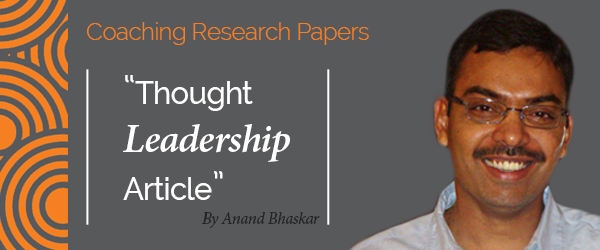Research Paper By Anand Bhaskar
(Executive Coach, INDIA)
Ever since I joined the industry 22 years ago, I often learnt from my mentors & coaches that change is the only constant. Be adaptable, flexible and willing to learn if you wish to succeed in the corporate world. As a young professional, I obediently listened to them and remembered the gospel of my seniors. You can see, I still remember it.
A couple of years ago I used to work for a respected FMCG company SPARTA with revenue of $250 million. We had a new CEO, Ravi who joined us from Unilever (which was $ 2b in revenue then), which had and continues to have a reputation of developing great leaders. SPARTA was in existence for more than 50 years and had a deep-rooted work ethic with a laid back culture. , Its market share was not challenged for many years, was steadily growing and was very profitable. The new CEO had a mandate from his global leadership to shake up the work ethic, drive aggressive growth and improve market share.
Ravi, in his initial days went across the country, met various executives & leaders, heard their views about issues in the business and got a grasp of what the challenges in the company were. After his India tour, he called the Management Committee (MC), the highest leadership body in India for a meeting to discuss what he learnt. Interestingly, the MC echoed the same issues/concerns that he had heard from the field. Ravi got excited and said to himself
I guess I understand what I need to change here.
Next two years were years of rapid change, Ravi made big bold decisions, he led from the front, the company refurbished its brands, launched new products/brands, re-launched its old boring brands with new packaging, formulations etc., many heads rolled in various parts of the country, change was finally happening.
2 years of pain-staking effort, Ravi appeared to be on a tread-mill and almost omnipresent in very meeting / forum. All these efforts, more than 50% of the people in the company were less than 2 years old, salaries grew, people were paid much better, some product launches succeeded, a few failed, the company grew marginally in market share, revenue & profits but the employee morale dropped significantly. End result – Ravi was fired !!
A couple of years later, I met Ravi in an external event. . He was still reeling under the scars of his past. We were reflecting on what went wrong – why did it not work, why did employee morale drop, why did sales/margin not grow as expected etc.? It was a million dollar question in his mind.
Why did the change not work? Ravi and I found ourselves a comfortable place in a bar and continued our conversation over a few drinks.
He drank and spoke; I chose to ask questions and listen instead of taking a drink. Here is how the conversation progressed.
Ravi said,
I was doing very well in Unilever successful with a big role. I was itching to run my own company. The opportunity seemed terrific. SPARTA, an MNC had promise, some good products and brands in its stable, a laid-back culture, moved slowly but had incredible potential. They got a new CEO globally; Roddy Lin and he hired me. He wanted to drive this company in India out of the woods and into growth. You know Unilever at that time was growing 18% YoY and this company was growing at a mere 6% and losing market share in all key product categories.
So I asked Ravi,
What was your mandate?
Ravi: I was told they wanted to shake up this place.
Me: What do you mean by ‘shake up’?
Ravi:
My predecessor was an old hand. He had been around for 25 years. He had a fixed way of doing things.. He was resistant to any change. They wanted a new man at the helm. They wanted me to take hard look at the leadership, assess their capability and determine if we had the right horses in the stable. They were not sure who they could bet on. They did not trust my predecessor’s assessment of the situation and the leadership team. I was told I should do what it takes to grow the company at par with competitors, which means 6% to 18% annual growth. That is how the market was growing at that time.
Me: So after you joined what was your assessment of the situation & the leadership?
Ravi: I found that in most cases the global assessment was right. The company was truly laid back. They had no measures around performance. Starting with manufacturing; factory productivity was low, poor quality processes, safety standards were pathetic, compliance was at bare minimum standards and much more. I was concerned that with these standards, scalability of output will be a big challenge. R&D had been pumping thousands of dollars into this thing and nothing had come out in the last five years. The first time I reviewed R&D work and results, I decided to shut this down completely as it wasn’t worth the money we poured into it. There were positives – the sales engine worked well, we had a strong distribution model and it made me happy. In product marketing and branding, there were a few good people but I knew we had to invest in this place. Therefore, I did invest and bring in some good people from Unilever.
